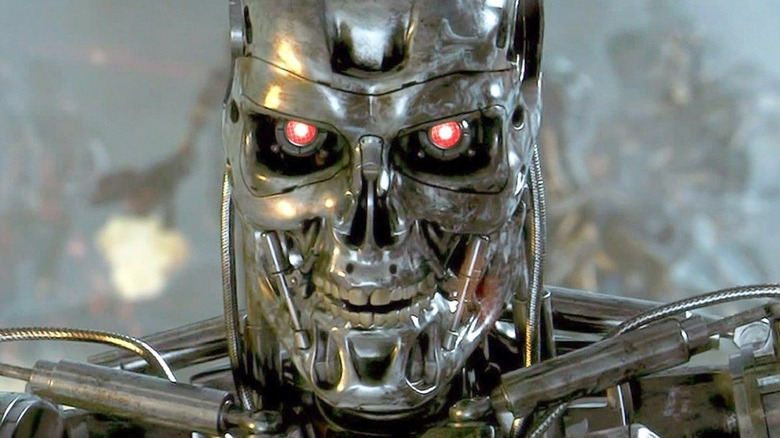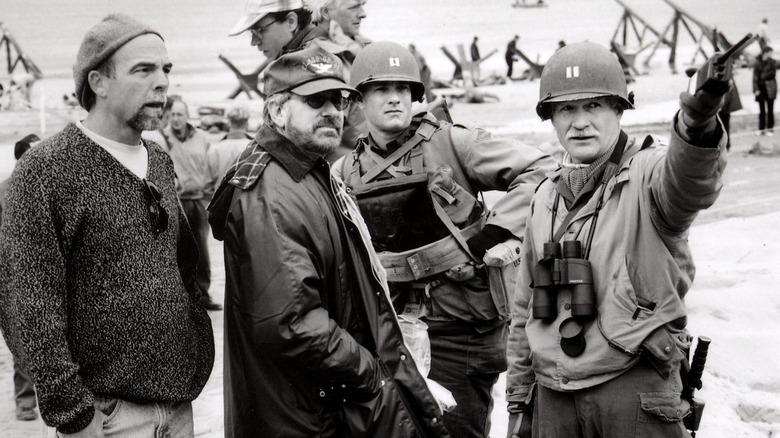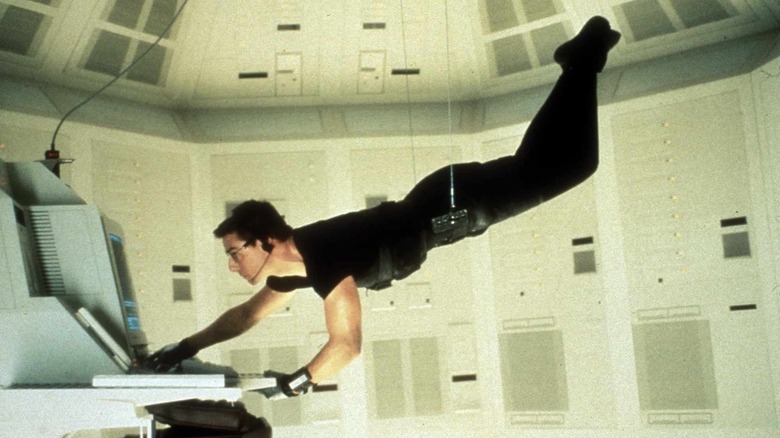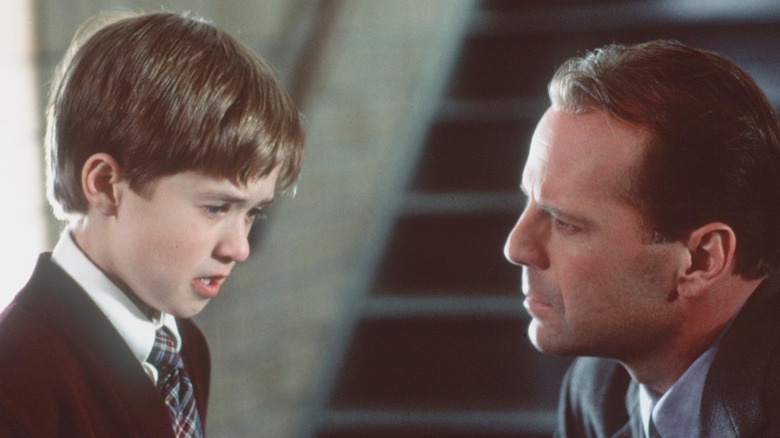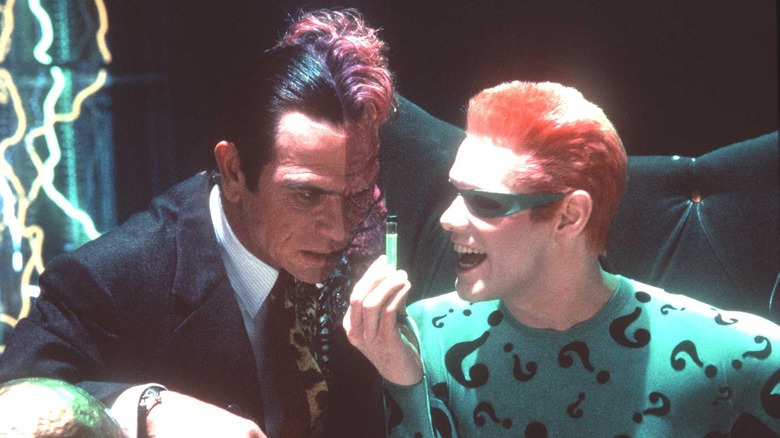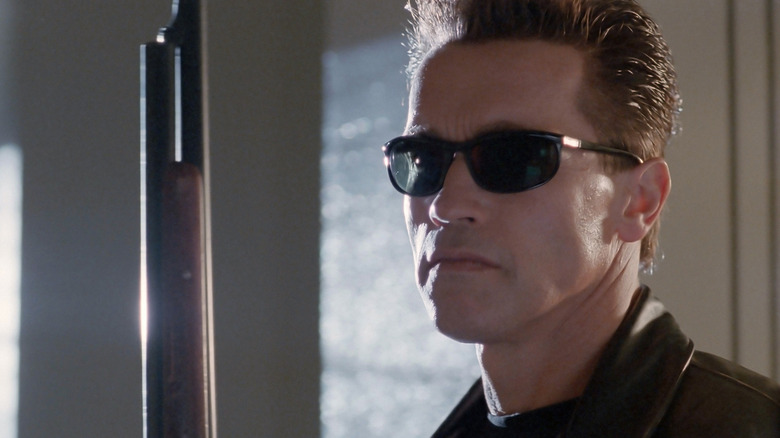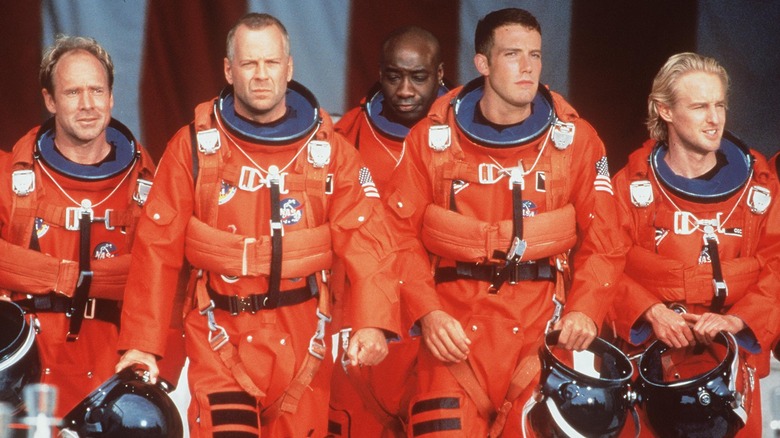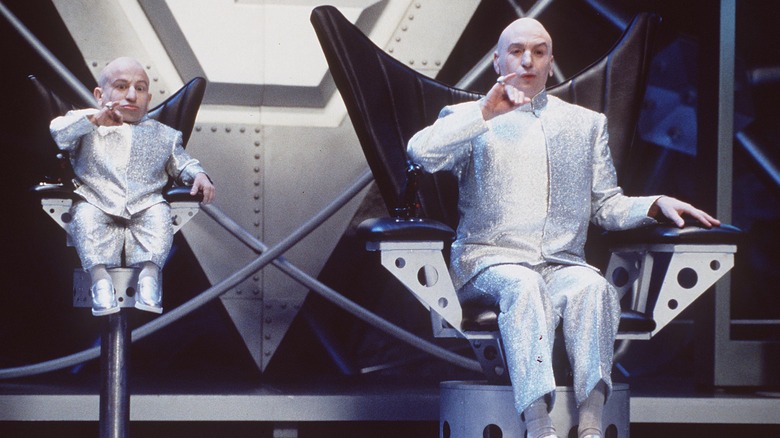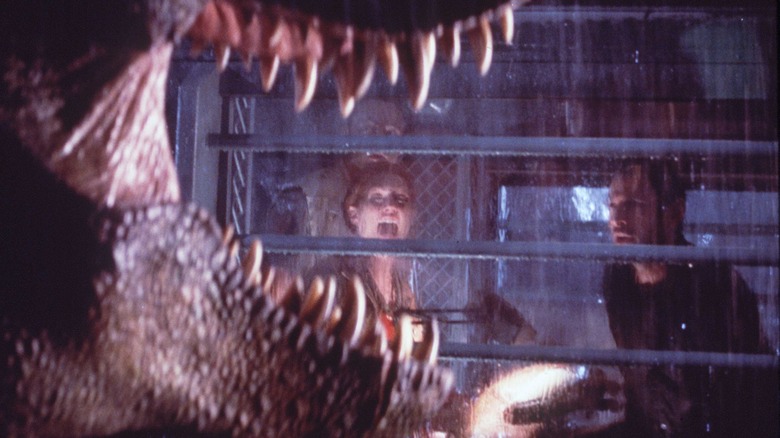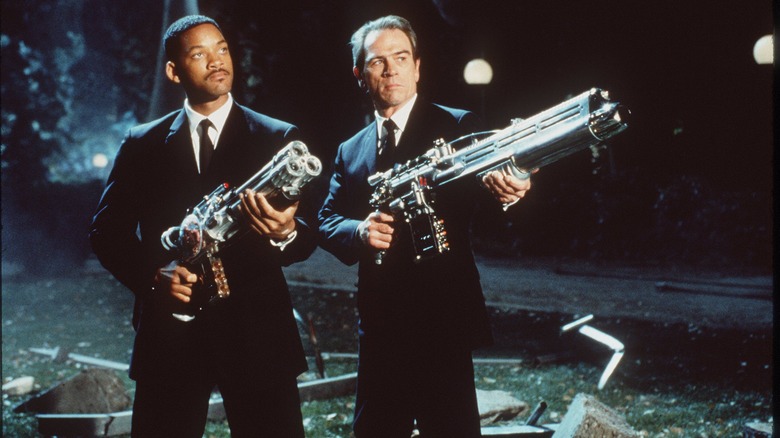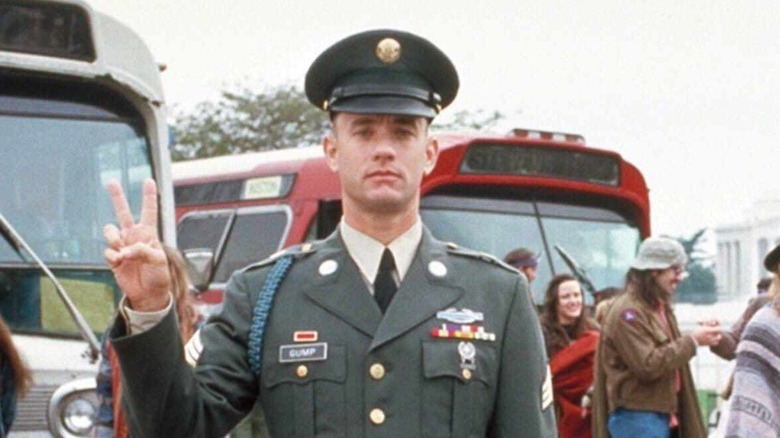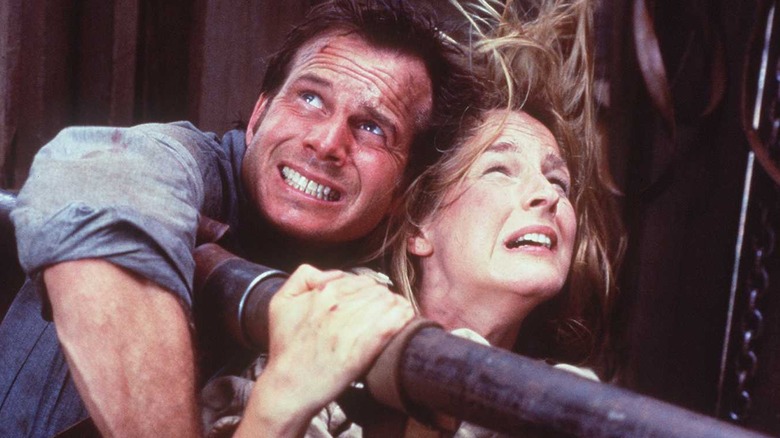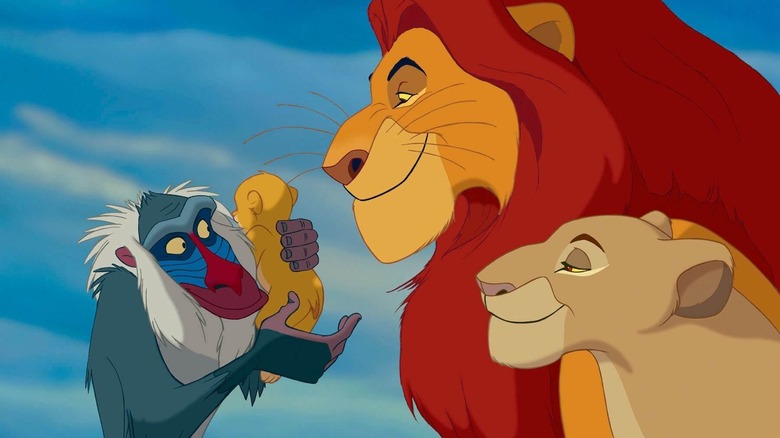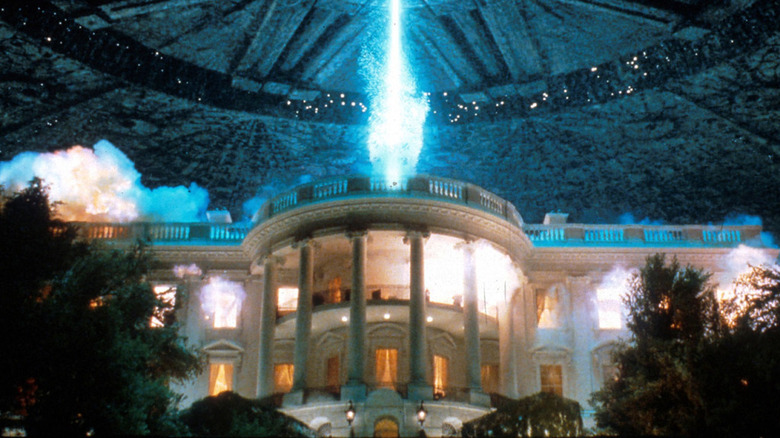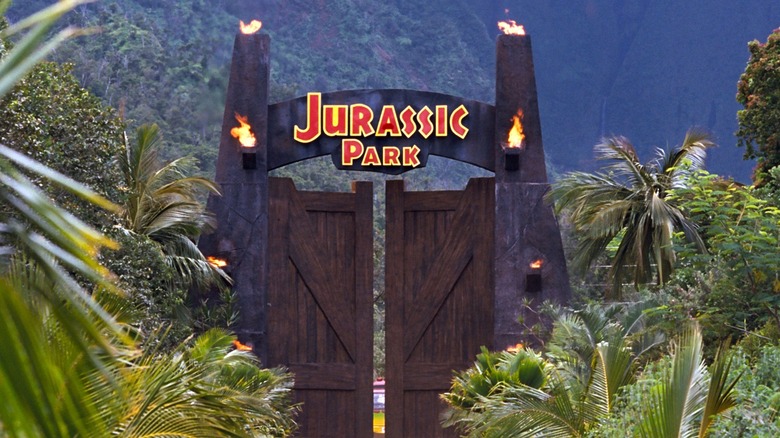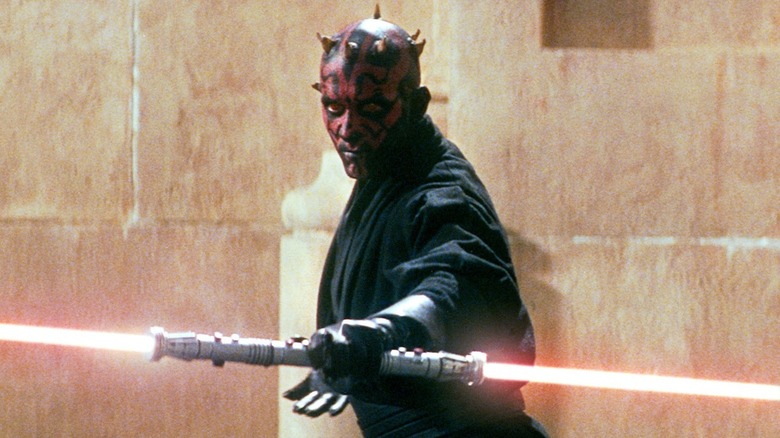The Biggest Summer Films Of The 1990s
The 1970s created the summer blockbuster, with "Jaws" sinking its sharp teeth into audiences' pocketbooks. The 1980s defined the summer blockbuster, with Spielberg, Lucas and company delivering classics that have stood the test of time.
The 1990s blew up the summer blockbuster. Sequels were the mainstay, but so were dino-sized big new films that became instant franchises, churning out new installments even to this day. The digital effects being put on display were so innovative and mind-blowing that fans not only lined up down the block to see a film on opening night, but to return to the theater multiple times to experience the movie magic all over again. There were also surprise hits that not only had ticket buyers seeing "dead people," but happy studios seeing gigantic profits.
From Memorial Day through Labor Day, each summer in the 1990s seemed to outdo the previous one. So much so that not even a single one of the top three grossers of 1990 ("Ghost," "Total Recall," "Die Hard 2") even rank in the top 15. In the final year of the decade, a record 11 films made over $100 million that summer. With help from Box Office Mojo and The Numbers, let's take a look back at the biggest summer movies of the 1990s.
15. Saving Private Ryan (1998) - $168,572,490
"The balance of personal drama, the abstract boredom of waiting for something to happen and the sudden terror of fire fights and hand-to-hand combat set me ablaze as a 14-year-old to want to make my own war movies," Steven Spielberg wrote in Newsweek. His own war movie became the D-Day epic "Saving Private Ryan," which marked the first collaboration between the director and actor Tom Hanks, although Spielberg had executive produced the Hanks-driven films "The Money Pit" and "Joe Versus the Volcano."
Slated to originally open on June 5, 1998, "Ryan" was pushed to July 24. It's competition was new releases "Disturbing Behavior" and "Jane Austen's Mafia," and even for a film running close to three hours, "Ryan" had no issue topping both, knocking off the Spielberg-produced "The Mask of Zorro" to claim the No. 1 spot. The $30.5 million gross could have actually been a bit higher, had there not been film print delivery issues to theaters in California and Arizona on opening day.
Nominated for 11 Academy Awards, "Ryan" won five, including Spielberg's second and last Oscar for Best Director. Hanks lost out to "Life is Beautiful" star Roberto Benigni for Best Actor, and in one of the largest upsets in the history of the Awards, the film saw "Shakespeare in Love" win Best Picture.
Spielberg and Hanks would team up again as director and actor in 2002 for "Catch Me If You Can," 2004's "The Terminal," 2015's "Bridge of Spies," and 2017's "The Post."
14. Mission: Impossible (1996) - $178,025,714
When Tom Cruise had his pick of his next project for Paramount Pictures, many were discouraging his idea of elevating the studio's "Mission: Impossible" TV property "from a Cold War TV series into a feature film." He found the film prospect to be "artistically challenging" and it moved forward with Brian De Palma as director, while renowned writers Steven Zaillian, David Koepp and Robert Towne taking stabs at the story and script. Original TV cast member Martin Landau had no interest in a cameo, nor the original script, and questioned in general the need for the movie, telling MTV, "Why revisit something that stands for itself?"
Squaring off against "Spy Hard," and opening in a record 3,012 theaters (13 years earlier, "Return of the Jedi” only opened in as third as many theaters), "Impossible" accomplished its box office "Mission" with $45.4 million that pre-Memorial Day weekend. Paramount's chairman and CEO Sherry Lansing told the New York Times, "No one could have ever dreamed the numbers we're getting." Cruise actually deferred his usual $20 million fee in exchange for a percentage of the box office, and did quite well for himself by doing so.
No fan of sequels at the time, Cruise looked at further "Missions" as another challenge, and found his path forward by having different directors tackle each one. The original film and four of its five sequels all rank within the top 20 on the Biggest Weekend at the Domestic Box Office for Movies Based on TV Shows chart.
13. The Sixth Sense (1999) - $181,153,817
When M. Night Shyamalan's agent was shopping his script, "The Sixth Sense," any studio who would buy it would have to adhere to his stipulations: "I have to be attached as director, and we're going to have a $1 million minimum bid." Disney bought the bait and the script, but when Bruce Willis joined the cast, more than doubling the budget, the studio laid off any potential financial risk by partnering with independent production company Spyglass Entertainment.
Originally expected to bow on September 10th, 1999, Disney decided to push up the release to August 6th. The decision paid off, even when it faced a busy opening weekend against other newbies "The Thomas Crown Affair," "Mystery Men," "The Iron Giant," and "Dick." "The Sixth Sense" knocked the other surprise horror film of the summer, "The Blair Witch Project," from the top spot, and grossed a then-biggest August opening ever of $28.5 million. With strong word of mouth and an instant catchphrase ("I see dead people"), the film continued to be a box office force, netting over $20 million every weekend straight through Labor Day, where it still stands as the No. 1 performer ever on that holiday.
"The Sixth Sense" would go on to become the second-highest-grossing film of 1999, and earn 6 Academy Award nominations, yet didn't win a single Oscar. While no sequel is on the horizon, star Haley Joel Osment told ComicBook.com that if Shyamalan ever asked, "I'd definitely be up to dive in there with him again."
12. Batman Forever (1995) - $181,401,070
After two Tim Burton "Batman" movies, no one expected a third Caped Crusader adventure without him or original star Michael Keaton to do all that well. Joel Schumacher got Burton's blessing to take over the franchise, a new Bruce Wayne (Val Kilmer), but very limited interest in merchandising, nor distribution of his "Batman" film outside of America. Schumacher told the Los Angeles Times, "I think it was a big risk. The cast took a big chance on me. Everybody took a big chance on me."
With Jim Carrey as The Riddler and Tommy Lee Jones at Two Face, "Batman Forever" swung into theaters on June 16 against "The Postman" (but not that "Postman"). On its first day in theaters, it surprised everyone to become the first movie to earn $20 million right off the bat, before totaling a weekend take of $52.8 million, which broke two records recently forged by "Jurassic Park."
Interest in "Batman" came back with a vengeance, and Schumacher got to helm the next picture, "Batman & Robin." George Clooney (with bat nipples) took over for Kilmer as the Dark Knight, and the end result proved to be a fan, critical, and box office disappointment. Batman was sent to movie jail for 8 years before Christopher Nolan rebooted the franchise, while Schumacher would keep on apologizing for "Batman & Robin" forever.
11. Terminator 2: Judgment Day (1991) - $184,146,088
One of the original ideas for the long awaited sequel to James Cameron's "The Terminator" was to have a good Arnold Schwarzenegger Terminator face off against an evil one, but it ended up as a good "Arnold versus the scary liquid metal weapon." That scary liquid metal weapon was almost played by Billy Idol, and the special effects used to create it made "Terminator 2: Judgment Day" a landmark film in both post-production and crowd-pleasing wizardry.
No expense was spared by production company Carolco Pictures Inc., which spent a record-breaking $100 million to work with what Larry Kasanoff, head of Cameron's Lightstorm Entertainment company, described to EW as "the biggest star in the world, the best effects people, and a brilliant director." Promoted by an earworm Guns N' Roses song and universally glowing reviews, "T2" was primed to conquer the summer of 1991.
Opening over the July 4th weekend versus "Problem Child 2," it knocked "Naked Gun 2 ½: The Smell of Fear" from the top spot with a record $31.7 million. That total still keeps it within the top 25 Independence Day opening weekend totals of all time. Carolco Pictures always had an eye and a foothold on the international market, and were rewarded with broken box office records the world over.
10. Armageddon (1998) - $192,543,903
In 1998, a comet and an asteroid were headed toward Earth, spelling doom for us all. Luckily, that was happening on screens, and not in actuality, as two similar-themed films vied for our attention that summer. Paramount's "Deep Impact" arrived at theaters first, had a higher opening weekend of the two, and was derided slightly less by critics. After a string of money losers ("Krippendorf's Tribe," anyone?), Disney needed their own disaster flick to be a hit: It was the studio's most expensive film to make at the time, with the LA Times reporting more than $200 million in production and marketing costs.
In critic Andrew Sarris' review, he confessed "that at times I found myself rooting for the meteor to hit the Earth and put us all out of our misery," but apparently audiences didn't agree and came in droves to see the Michael Bay film, co-written by a then-less-known J.J. Abrams. "Armageddon" kicked "Doctor Doolittle" from the No. 1 spot, and ultimately made $60 million more than "Deep Impact" did. 20-plus years later, people are still trying to stack the two against each other. "Armageddon" ended up being Disney's 54th highest grossing domestic movie ever, and only two of the studio's films from the 20th century did better than it — "The Sixth Sense" and "The Lion King."
And for the record, no, Michael Bay does not apologize for "Armageddon."
9. Austin Powers: The Spy Who Shagged Me (1999) - $205,266,271
1997's "Austin Powers: International Man of Mystery" only grossed $53.8 million in total at the box office, but when it hit the home video market, and found an even bigger following, it acted as "a two-hour marketing tool" for the sequel.
New Line Cinema ramped up the marketing and promotion for the 1999 follow-up film, but knowing that "The Phantom Menace" was unbeatable that summer, the teaser trailer played up that fact and implored viewers that "if you see two movies [this summer] see 'Austin Powers: The Spy Who Shagged Me.'"
People did see "Phantom Menace," but four weeks into its stronghold on the box office, "The Spy Who Shagged Me" snagged the top spot from it, making more in its first three days than the original "Austin Powers" did in its entire run. In its second week, "Spy" slipped to second place, sandwiched between newcomers "Tarzan" and "The General's Daughter." Those three films earned over 20 million each, which was the first time that ever happened at the box office. "Spy" holds the title of highest June opener of a film from the 20th century, and ranks No. 12 for the highest grossing domestic comedy movie of all time. The third "Austin Powers" movie did even better and ranks No. 10. A fourth installment has yet to see the light of day, but never say never again.
8. The Lost World: Jurassic Park (1997) - $227,945,139
The only franchise with two installments on this list is "Jurassic Park," although Steven Spielberg had long refrained from directing sequels, telling the New York Times that they "aren't as good as my originals because I go onto every sequel I've made and I'm too confident." When he did decide to move forward with the second "Jurassic" feature, "The Lost World," he thought four years after the first was perhaps too soon, believing that ”you have to let the audience's appetite build,” as he told his screenwriter, David Koepp.
Despite protests and boycotts from environmentalists, "The Lost World" found plenty of ticket takers on its opening weekend, playing in 3,281 theaters and on a then-record 6,000 screens against the Matthew Broderick and Meg Ryan trifle "Addicted to Love." "Jurassic" actor Jeff Goldblum popped into several Los Angeles screenings of the film, watching the audience "screaming and laughing their heads off." Its $90+ million haul over Memorial Day weekend broke records at the time of its release, and stands today as the only 20th century movie on the top 10 of all time box office winners for that holiday. Concession sales roared as well, with one theater manager in San Francisco noting, "Watching this type of action film really stimulates the energy and the appetite."
7. Men in Black (1997) - $235,507,984
Will Smith had reservations about being in two alien movies in back-to-back summers, but "when Steven Spielberg calls you at home, it's real hard to say no," he told the Los Angeles Times. That Spielberg-produced movie, Barry Sonnenfeld's "Men In Black," almost starred Chris O'Donnell and Clint Eastwood, but had Smith and Tommy Lee Jones throw on shades, dress in black, and keep aliens (including Spielberg) in control on earth. The $3.5-million teaser trailer debuted in the third quarter of Super Bowl XXXI, alongside other Sony releases "The Devil's Own" and "The Fifth Element," ending with the narrator instructing the viewer to "return to your nachos now."
The summer of 1997 was a busy one for anyone interested in all things extraterrestrial. Russia's Mir space station had a collision in late June, NASA's Pathfinder probe landed on Mars, and "Men In Black" landed in theaters to kick off July, with its "disruptive" director dropping in on theaters to check in on audiences. That weekend (which "Titanic" opted out of and moved to winter), Will Smith sunk the Jack Lemmon/Walter Matthau septuagenarian comedy "Out to Sea," and would top his own previous summer adventure, "Independence Day," to become the 20th century's highest earner over the July 4th holiday. When everyone suited up for the 2002 sequel, "Men in Black II," it topped both its predecessor and "Independence Day." For that, Smith was long known as "King of the Fourth of July."
6. Forrest Gump (1994) - $241,017,723
It took nine years for producer Wendy Finerman to bring Winston Groom's 1986 novel "Forrest Gump" to the big screen, with endless rejections and "Rain Man" comparisons holding it back. Groom envisioned John Goodman for the lead, while John Travolta was offered it but passed. It finally took shape at Paramount Pictures, with director Robert Zemeckis and star Tom Hanks even chipping in their own money to get it to the finish line.
When "Forrest Gump" was released on July 6th, 1994, it barely edged out "The Lion King" for the top box office spot. While "True Lies" bumped it down a peg the following week, it jumped back to No. 1 in its third week. It ping-ponged up and down the chart thereafter, but returned to the top in its 7th, 9th and 10th weeks. It briefly left theaters before returning after the Academy Award nominations were announced, and didn't leave them again until May 19, 1995. In that run, it surpassed "Raiders of the Lost Ark" and "Beverly Hills Cop" to top Paramount's All Time Domestic Box Office, and currently ranks No. 4 for the studio.
On Oscar night, "Forrest" and its 13 nominations squared off against the underdog "Pulp Fiction." It took home six statues, including Best Picture, Best Director, and Best Actor (Hanks became the second male actor ever to do so in consecutive years). And yet the most lasting legacy of the film was a joint "eater-tainment" venture between the studio and Rusty Pelican Restaurants Inc. – The Bubba Gump Shrimp Co., which is still going strong 25 years later.
5. Twister (1996) - $241,721,524
Director Jan de Bont's "Twister" got a lot of free advertising and publicity thanks to the public's existing thirst for tornadoes. The film's early May release date was chosen to pair with peak tornado season, when TV newscasts would air the real thing over and over. Radio and TV reports estimated more than 900 twister-related programs were seen in America in and around the opening of "Twister," including a Fox made-for-TV movie titled "Tornado!" that Warner Bros. Pictures bought commercial air time to promote their own movie. Even "The Wizard of Oz" and its wind sock tornadoes got a fresh re-airing on CBS.
The film opened against "Original Gangstas," which starred many of the '70s' Blaxploitation stars, and went gangbusters, capturing over two-thirds of every ticket sold on its opening weekend. It broke the record held by "The Flintstones" for highest May debut, but then had its own record broken by "Mission: Impossible" two weeks later. By the end of the summer and year, "Twister" would prove to be the bigger of the two films, but both would trail "Independence Day" as the ultimate blockbuster of 1996.
"Twister"-mania swept the nation, landing on the cover of Time magazine (perhaps not so coincidentally owned by Warner Bros.), while the cast and real-life storm chasers appeared on a special episode of "Oprah." As an extra, uh, twist, Ben Stiller and Janeane Garofalo (and Jay Leno) spoofed the film as a "Twister" opening to the 1996 MTV Movie Awards.
4. The Lion King (1994) - $262,913,410
Hot on the heels of "Aladdin," Disney promoted its next film with an extended preview on its 22-million-unit selling "Aladdin" VHS tape. With a built-in audience hungry for the studio's 32nd animated feature film, "The Lion King" opened initially in only two movie theaters, where it racked up an impressive $793,377 average per theater (still a record) in its first weekend. When the film opened wide, it became the "king" hit of the summer, despite many of its tickets sold at children's or matinee prices. In an unconventional move, Disney pulled "Lion King" from theaters that September, and re-released it in time for Thanksgiving. It wouldn't leave theaters again until March of 1995. It currently ranks #28 on the all time domestic box office chart, #2 for G-rated movies, and will forever remain king of the Hand Animation Movies chart.
The film netted four Academy Award nominations, and won two – Elton John and Tim Rice's "Can You Feel The Love Tonight" for Best Original Song, and Hans Zimmer for Best Original Score. It also won three Grammys, and became the first Disney soundtrack to top the charts since "Mary Poppins" – one of only five soundtracks from an animated movie to do so.
"The Lion King" spawned two direct-to-video sequels, a Tony Award-winning Broadway musical, and a 2019 live-action remake that went onto become the No. 1 all-time remake champion at the box office. When the original "Lion King" was re-released in 3D back in 2011, it even prevented Brad Pitt and "Moneyball" from scoring the top spot at the box office.
3. Independence Day (1996) - $282,772,244
Roland Emmerich and his writing partner Dean Devlin don't believe in extraterrestrial beings, which didn't stand in the way of their surprise 1994 hit "Stargate," or their follow-up project about an alien invasion of earth, "Independence Day." Tim Burton's similar "Mars Attacks" was also on the horizon, so Emmerich wanted to beat them to theaters and pushed for the title and release of the film on the titular day. He also fought for the casting of Will Smith, who the studio didn't think could carry foreign markets. The film actually opened on the 3rd of July, and "Mars Attacks" ended up going on the defensive, leaving its initial summer release date plans for the winter.
Fox spent a reported $1.3 million on a 30-second teaser trailer for "Independence Day" that blew up the White House (where the film was later screened for the Clintons) and told the fans watching the Cowboys tackle the Steelers, "Enjoy the Super Bowl, because it may be your last."
When it was released in theaters on the same holiday weekend as "Phenomenon," Devlin saw that film's director, Jon Turteltaub, in line to see his "Independence Day." It more than tripled the John Travolta film's take and knocked "The Nutty Professor" from the top spot. It currently ranks #15 of all time for the July 4th holiday, and is 20th Century Fox's 9th highest grossing domestic film ever. A sequel came to fruition 20 years later, with Will Smith opting out to "do new things," and Emmerich regretting making the final product without him.
2. Jurassic Park (1993) - $317,240,205
Many dinosaur films have roamed the earth prior to Steven Spielberg tackling Michael Crichton's book "Jurassic Park," but most of them featured creatures that lacked mobility and believability. Thanks to advancements by companies like Industrial Light and Magic and filmmakers like James Cameron on "Terminator 2," digital dinosaurs were ready to fully roar (in fact it was Spielberg who beat Cameron to the punch to secure the book's rights). "I'd wanted to make a dinosaur picture all my life because I was a huge fan of Ray Harryhausen," Spielberg told Richard Schickel. "'Jurassic Park' was the first movie where the entire success or failure of the story was dependent on these digital characters."
Universal Pictures was in need of a monster hit, and put a lot of financial resources into making and marketing (and merchandising) "Jurassic Park." Amazingly enough, Spielberg was putting the finishing touches on "Jurassic" while he was filming the more serious "Schindler's List" in Poland. Both films were released in 1993, with his dino-tale bowing on the very same day his "E.T." did 11 years earlier, June 11. Nine days after it hit theaters, "Jurassic Park" set (then) domestic records for biggest late-night preview, biggest three-day opening weekend, fastest to reach $100 million, then $200 million. The film's producer, Kathleen Kennedy, was sort of rooting against it, telling EW, "I'm not sure I want it to pass 'E.T.,'" a film she also produced. "'E.T.' is a special little movie to me." In the end, it didn't surpass the little extra-terrestrial domestically, but did internationally and worldwide.
1. Star Wars: Episode 1 - The Phantom Menace (1999) - $421,599,674
After the first "Star Wars," George Lucas left the director's chair to focus on other aspects of his franchise's newly expansive galaxy, including the doubly profitable toys and merchandising unit. 22 years later, Lucas finally returned to the director's chair with 1999's "Star Wars: Episode I – The Phantom Menace."
Public anticipation for the next (actually previous) chapter in the "Star Wars" saga was unlike anything seen before. A full on media blitz commenced, with "midnight madness" shoppers, including Penny Marshall, Ron Howard and Kevin Smith, snapping up the latest toys, and advanced tickets being gobbled up by fans at the box office or over the phone.
"The Phantom Menace” was the first wide release film to be screened digitally, and to be heard in Dolby Digital-Surround EX. When it was released, opposite the Kate Capshaw romantic comedy "The Love Letter," many people played "Wookie hooky," which one firm estimated may cost businesses "as much as $300 million in lost wages."
"Episode I" opened on a Wednesday and set a then-record single-day gross of $28 million, then went on to shatter the record set by "Independence Day" to become the fastest film to reach the $200 million mark in only 13 days. It more than doubled that amount by the end of the summer, eventually earning $475 million domestically. While the exploration of Anakin Skywalker's young life left many fans disappointed, it didn't stop them from going back to see it again and again.
